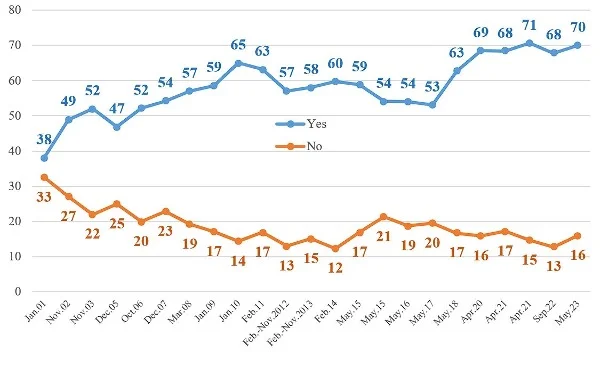After more than 16 months of death and devastation, Ukrainians are just as happy as they were at the beginning of Russia’s full-scale invasion of their country – and much happier than they were 20 years ago, according to new survey results.
It shows Ukrainians are remarkably resilient with nearly four out of five of those surveyed saying they have a friend or relative who has been injured or killed during Russia’s war on Ukraine.
JOIN US ON TELEGRAM
Follow our coverage of the war on the @Kyivpost_official.
The new insights derive from a survey conducted by the Kyiv Institute of Sociology (KIIS) who interviewed a representative sample of 1000 Ukrainians at the start of Ukraine’s summer offensive. KIIS polled people across a range of regions, age groups, genders, and income levels.
“It is fundamentally important that the happiness indicator has practically not changed both in general and among certain categories of the population. Ukrainians, despite the sea of difficulties and challenges today, find ways to adapt to the complex reality and move forward,” KIIS said in releasing its polling results on Friday.
For more than 20 years KIIS has been asking Ukrainians the question “Do you consider yourself a happy person?” KIIS asked its benchmark question in December 2021, 2 months before the full-scale Russian invasion; in September 2022, after the invasion; and again, in May 2023, after more than a year of full-scale war.

Trump Makes 90 Day Foreign Aid Freeze – Ukraine Military Support Supposedly Untouched
“On the eve of the invasion, 71% of Ukrainians considered themselves happy, and 15% did not consider themselves happy,” KIIS said.
“As of May 2023, despite more than a year of full-scale war, the indicators remain practically the same. Now, 70% of Ukrainians consider themselves happy,” KIIS stated while saying the results have a margin of error of under 3.4 percent.

Graph 1. Do you consider yourself a happy person?
Over the last twenty years, the number of Ukrainians reporting that they are happy has risen from 52 percent in November 2003 to 70 percent now. That means some one-third of Ukrainians have changed to being happy over that period.
In other results from the most recent KIIS poll:
· Western Ukrainians are the happiest (75 percent) and southern Ukrainians less happy (66 percent);
· Large city dwellers (74 percent) are happier than village residents (67 percent);
· Internally displaced persons (IDPs) are considerably less happy (52 percent) than non-IDPs (72 percent), but even among IDPs a small majority are happy;
· Women (72 percent) are slightly happier than men (69 percent);
· Young people are the happiest of all (84 percent) and much happier than the elderly (60 percent).
| Dec 2021 | May 2023 | |||
| Yes | No | Yes | No | |
| Region where respondent lived until February 24, 2022 | ||||
| West | 75 | 12 | 72 | 13 |
| Center | 71 | 16 | 72 | 12 |
| South | 66 | 16 | 69 | 20 |
| East | 69 | 14 | 60 | 27 |
| Type of settlement where respondent lived until February 24, 2022 | ||||
| Village | 67 | 17 | 66 | 18 |
| City up to 20 thousand / UTS | 74 | 14 | 74 | 14 |
| City 20-99 thousand | 64 | 17 | 72 | 20 |
| A city of 100,000 or more | 74 | 12 | 70 | 14 |
| IDP or non-IDP | ||||
| Non-IDP | --- | --- | 72 | 14 |
| IDP | --- | --- | 54 | 31 |
| Gender | ||||
| Men | 69 | 16 | 71 | 15 |
| Women | 72 | 14 | 68 | 18 |
| Age | ||||
| 18-29 years | 84 | 5 | 73 | 18 |
| 30-39 years | 78 | 10 | 81 | 12 |
| 40-49 years | 71 | 13 | 67 | 13 |
| 50-59 years | 64 | 21 | 66 | 18 |
| 60-69 years | 63 | 18 | 67 | 16 |
| 70+ years | 60 | 23 | 60 | 24 |
| Family income level | ||||
| Very low | 47 | 38 | 42 | 47 |
| Low | 59 | 20 | 63 | 20 |
| Average | 76 | 10 | 69 | 14 |
| High | 86 | 6 | 87 | 6 |
Graph 2: Demographic Breakdown of Happiness
Other KIIS results show many negative consequences for ordinary Ukrainians resulting from the Russian invasion – which underscore their remarkable resilience:
· 78% talk about the injury or death of at least one of their relatives or friends;
· 64% - about a decrease in income;
· 29% - about the loss of a job;
· 64% - about deterioration of mental health,
· 55% - about deterioration of physical health.
Following the Maidan revolution in late 2013 and Russia’s invasion of Donbas and Crimea in early 2014, Ukrainians’ happiness levels fell to a ten-year low, but have been consistently rising since 2017.
You can also highlight the text and press Ctrl + Enter










